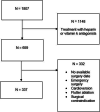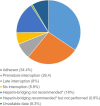Clinicians' adherence to guidelines for the preoperative management of direct oral anticoagulants in a tertiary hospital: a retrospective study
- PMID: 37715136
- PMCID: PMC10503177
- DOI: 10.1186/s12871-023-02276-w
Clinicians' adherence to guidelines for the preoperative management of direct oral anticoagulants in a tertiary hospital: a retrospective study
Abstract
Introduction: Despite clear, relatively easy-to-use guidance, many clinicians find the preoperative management of direct oral anticoagulants (DOACs) challenging. Inappropriate management can delay procedures and lead to haemorrhagic or thromboembolic complications. We aimed to describe preoperative management practices regarding DOACs in a tertiary hospital and clinicians' adherence to in-house recommendations.
Method: We included all patients being treated with DOACs who underwent elective surgery in 2019 and 2020 (n = 337). In-house recommendations for perioperative management were largely comparable to the 2022 American College of Chest Physicians guidelines.
Results: Typical patients were older adults with multiple comorbidities and high thrombotic risk stratification scores, and 65.6% (n = 221) had not undergone recommended preoperative anticoagulation management protocols. Patients operated on using local anaesthesia (adjusted OR = 0.30, 95%CI 0.14-0.66; p < 0.01) were less likely to have been treated following institutional recommendations, but no association between their procedure's bleeding risk and adherence was found. Clinicians' failures to adhere to recommendations mostly involved late or non-indicated interruptions of anticoagulation treatment (n = 89, 26.4%) or inappropriate heparin bridging (n = 54, 16.0%). Forty-five (13.3%) procedures had to be postponed. Incorrect preoperative anticoagulation management was directly responsible for 12/45 postponements (26.7% of postponements).
Conclusion: This study highlights clinicians' low adherence rates to institutional recommendations for patients treated with DOACs scheduled for elective surgery in a tertiary hospital centre. To the best of our knowledge, this is the first clinical study addressing the issue of clinicians' adherence to guidelines for the preoperative management of DOACs. Going beyond the issue of whether clinicians are knowledgeable about guidelines or have them available, this study questions how generalisable guidelines are in a tertiary hospital managing many highly polymorbid patients. Further studies should identify the causes of poor adherence.
Keywords: Anticoagulant; DOAC; Management; Periprocedural; Preoperative; Surgery.
© 2023. BioMed Central Ltd., part of Springer Nature.
Conflict of interest statement
The authors declare no competing interests.
Figures



References
-
- January CT, Samuel WL, Hugh C, Chen LY, Cigarroa JE, Cleveland JC, et al. AHA/ACC/HRS Focused Update of the 2014 AHA/ACC/HRS guideline for the management of patients with atrial fibrillation: a report of the American College of Cardiology/American Heart Association task force on clinical practice guidelines and the heart rhythm society in collaboration with the society of thoracic surgeons. Circulation. 2019;2019(140):e125–e151. doi: 10.1161/CIR.0000000000000665. - DOI - PubMed
Publication types
MeSH terms
Substances
LinkOut - more resources
Full Text Sources

